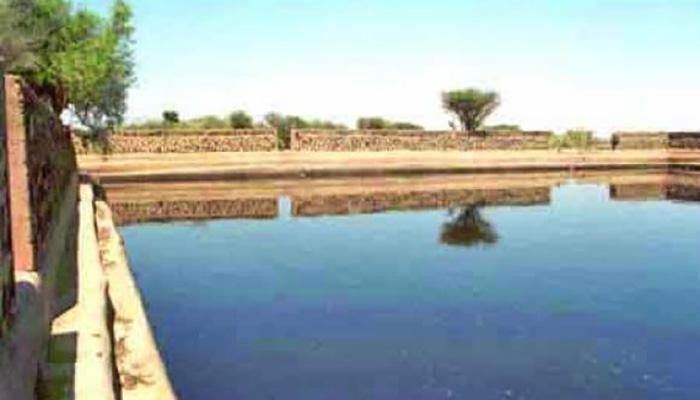
Kingdom wants Darb Zubaida on UNESCO world heritage list
The historic pilgrimage route from Iraq to the holy city of Makkah — Darb Zubaida — is the new entry from the Kingdom for UNESCO’s world heritage list.
After successful quest last year for historic Jeddah to be listed, the Saudi Commission for Tourism and Antiquities (SCTA) began preparations for additional historic and archaeological landmarks in the Kingdom and recommended 10 for registration.
“The government has approved SCTA’s request to register 10 sites on the world heritage list. One of them is Darb Zubaida because of its cultural and historic importance in Islamic history,” SCTA announced on Sunday.
Saad Al-Rashid, an adviser in the heritage department of SCTA, pointed out that Darb Zubaida was well-known in Islamic history among all Muslims — caliphs, sultans and ministers as well as ordinary pilgrims.
“The Kingdom is very interested in sites relating to Islamic history and Darb Zubaida is one of the most important,” he said.
Darb Zubaida, the Haj route from Iraq to Makkah, is named after Zubaida bint Jafar, the wife of Caliph Haroon Al-Rasheed. Her charitable efforts and various preparations on behalf of all Muslims along the route have been appreciated for hundreds of years.
According to SCTA, this unique route’s history dates back to the pre-Islamic era, but its importance increased after the emergence of Islam, in the time of the Prophet (peace be upon him) and the Caliphs and later during the time of the Umayyads.
The route reached its greatest prosperity during the Abbasid era when the stations and resting places were provided with water wells, lakes, dams and palaces.
Many services were available along the route.
Among Zubaida’s most significant charitable works which had great impact on the Muslim nation during her life and after her death is Ain Zubaida, an architectural landmark in Holy Makkah.
Darb Zubaida also has economic importance in its contribution to reviving trade from the earliest days of Islam.
The route was busy with Haj and trade caravans from Al-Kufa in Iraq to Makkah and Madinah. It was a bridge linking Iraq and the eastern Islamic areas with the Two Holy Mosques, passing to other parts of the Arabian Peninsula, including Yemen, besides connecting Arabia’s eastern section with Africa and the far west.
After successful quest last year for historic Jeddah to be listed, the Saudi Commission for Tourism and Antiquities (SCTA) began preparations for additional historic and archaeological landmarks in the Kingdom and recommended 10 for registration.
“The government has approved SCTA’s request to register 10 sites on the world heritage list. One of them is Darb Zubaida because of its cultural and historic importance in Islamic history,” SCTA announced on Sunday.
Saad Al-Rashid, an adviser in the heritage department of SCTA, pointed out that Darb Zubaida was well-known in Islamic history among all Muslims — caliphs, sultans and ministers as well as ordinary pilgrims.
“The Kingdom is very interested in sites relating to Islamic history and Darb Zubaida is one of the most important,” he said.
Darb Zubaida, the Haj route from Iraq to Makkah, is named after Zubaida bint Jafar, the wife of Caliph Haroon Al-Rasheed. Her charitable efforts and various preparations on behalf of all Muslims along the route have been appreciated for hundreds of years.
According to SCTA, this unique route’s history dates back to the pre-Islamic era, but its importance increased after the emergence of Islam, in the time of the Prophet (peace be upon him) and the Caliphs and later during the time of the Umayyads.
The route reached its greatest prosperity during the Abbasid era when the stations and resting places were provided with water wells, lakes, dams and palaces.
Many services were available along the route.
Among Zubaida’s most significant charitable works which had great impact on the Muslim nation during her life and after her death is Ain Zubaida, an architectural landmark in Holy Makkah.
Darb Zubaida also has economic importance in its contribution to reviving trade from the earliest days of Islam.
The route was busy with Haj and trade caravans from Al-Kufa in Iraq to Makkah and Madinah. It was a bridge linking Iraq and the eastern Islamic areas with the Two Holy Mosques, passing to other parts of the Arabian Peninsula, including Yemen, besides connecting Arabia’s eastern section with Africa and the far west.
Share:
ADD TO EYE OF Riyadh
MOST POPULAR
Regulations of Trade Names, Commercial Register Laws approved
Thursday 3 April, 2025 1:00New real estate measures to support household spending, private sector: Minister
Thursday 3 April, 2025 1:35Crown Prince’s directives on real estate sector to curb inflation
Thursday 3 April, 2025 1:37New commercial register, trade names laws effective as of April 3
Thursday 3 April, 2025 1:17LCGPA adds 116 products to mandatory list of national products
Thursday 3 April, 2025 1:19 ×


























